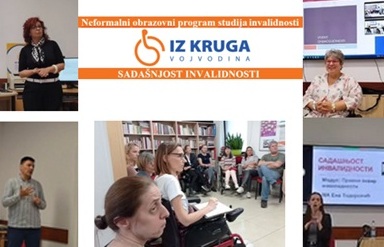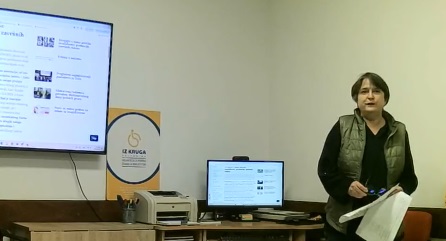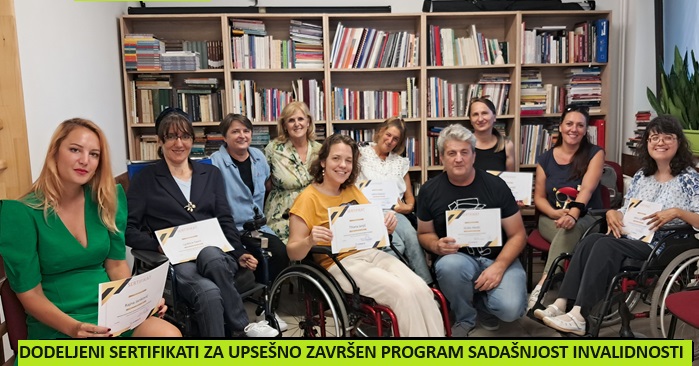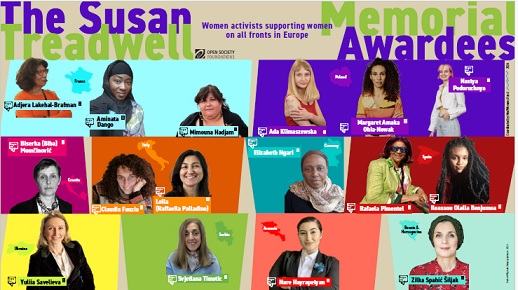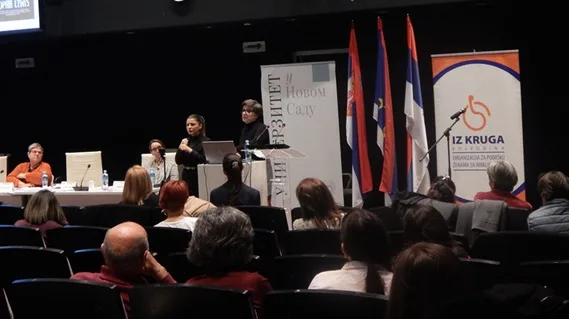Marija Milanovic got a Bachelor’s degree in psychology and a Master’s in communication science. She teaches Civic Education in the primary school Branislav Nusic in Donja Trvnava near Nis. She volunteers in the Psychological counseling center for students in Nis as a psychotherapist under supervision. She has been an activist for the rights of women and young with disabilities for years (Council for Ethical Issues – SEP NAPOR, Union of Blind Serbia, Center for Independent Living of Persons with Disabilities Serbia). She likes to walk and hike on less challenging paths.
Did you find accepting your imparity troublesome?
When you grow from birth with the fact that you are a child with a lack of vision, it spontaneously becomes a part of you and your identity. Accepting our diversity compared to others is much easier than for the ones that lost their vision during life because they lived a completely different, ordinary life previously that losing sight changes. Having said that, I know some people that started living a much more fulfilled life as persons with disabilities as opposed to the one they lived before – they travel more, socialize more, etc. It appears they grasped the true value of life only as persons with disabilities.
I had no trouble excepting my identity. It is the same for me as someone’s height, eye color, and body structure.
My family must have influenced that attitude; they never separated me from my older brother or pitied me, overprotected me, or observed my lack of vision as something tragic. They brought me up in that way.
Besides my family, I had support from my teachers, my primary school and kindergarten teacher, and friends at school and boarding school where I lived during primary and high school.
We got along well at school and learned as in any other school. The only difference was that we used accessible, didactic tools like Braille, relief maps, and sports with sound balls. I enjoyed myself there so much that starting from fourth grade, I told my parents not to take me home every weekend but every third one. We were a good team indeed, a genuine friendship among us.
How did you choose the occupation?
I got to love psychology through psychological workshops, Good Will Classrooms and Guardians of Smile, led by our house parents in sixth and seventh grades. I liked we could talk about various subjects related to emotions on a higher level, so I told my mates that I would study psychology in the eighth grade. And I fulfilled that wish. I also had fabulous psychology teachers in primary and high school who were my motivation and role models of the kind.
Are visually impaired women inclined towards certain professions?
Due to the opportunities offered by the education system and the conditions for teaching at faculties, blind women mostly opt for social and humanities, languages, law, etc. They rarely apply for computer programming because our universities don’t have adequate conditions for visually impaired persons to major in IT. A visually impaired person cannot choose some faculties because of the limitations of the disability. For example, they cannot be a GP, a surgeon, a dentist, an architect, a painter, a flight attendant, and similar.
Everyone in my family is an architect, but not even state-of-the-art speech synthesizers or drawing software cannot make up for or compensate for the lack of visual perception. One has to be realistic about it. I often hear: – Why do they choose the law and social science? It is harder to get a job in those occupations! I ask them then: – Would you ride in a bus driven by a blind woman or choose her to design a poster? No matter how advanced technology is, it is still not omnipotent and cannot contribute to the compensation of visual perception in all spheres of life.
What is your first thought on the word work, and what emotions does it evoke?
It associates me with vitality, pride, steady income, self-fulfillment and self-confidence, and pleasure in searching for the right job done with love.
You teach Civic Education in primary school. How did you get the job?
I met the current headmaster of the school I now work at the seminar about professional practices of graduated students in educational institutions in Nis. He approached me and was curious about how visually impaired persons live and observe the world. Later he recommended I participate in different workshops on various inclusive projects for children in the sports association Nigresiv. After some years, he suggested I should apply for the job of a teacher at school.
In your opinion, do blind and visually impaired women have the same right to work as other persons?
Under the Constitution and laws of our country, blind women have equal rights as any other woman, including the right to education and work. Legally there is no difference. However, it is different in practice. Blind and visually impaired women find it difficult to get a job because employers are not informed that a blind person can learn to navigate and move independently in the workspace, come to work on their own or organize the commute, can use a computer and a smartphone with the help of the screen reader, etc. and do a lot of office work in that way, and that a blind person has a plethora of other traits, and being blind is just one of them, not the only one.
I also need to emphasize that existing laws do not recognize a blind and visually impaired person as a separate category, even less a blind and visually impaired woman, but as a person with a disability. For example, The Law on Professional Rehabilitation and Employment of Persons with Disabilities was a step in the right direction, but it needs to be upgraded. I think that it is necessary to reduce the obligation of employers to pay the penalty if they do not employ a person with a disability and to increase support for employers who do; at the same time, prevent the possibility of abuse of benefits due to the employment of a person with a disability. Besides, we need to redefine priorities when it comes to persons with various types and degrees of disabilities because the practice shows that the higher the percentage of disability and the more visible it is, the more difficult it is for a person to be employed.
Instigating the public sector to employ persons with disabilities more is significant because, to put it mildly, it is hypocritical that a state that prescribes a law expects the private sector to carry the burden of employing persons with disabilities and that those institutions that designed and enacted this law do not promote and respect the employment of persons with disabilities in their sectors.
Talking about blind people specifically, many of them could work in a large number of institutions in many positions and workplaces that suit their educational profile and qualifications.
What would you tell decision-makers in the area of employment of women with disabilities and specifically of blind and visually impaired women?
My first recommendation would be to minimize the misuse of benefits of employing persons with disabilities through the legal framework. I have no illusions in this sense, but to allow employers to hire a new person with a disability every year or two in the same company, in the same sector, in the same workplace, on the principle that when the subsidy for one person with a disability expires, we will hire another person with a disability, so when the grant for her also expires, we will employ a third disabled person and so on.
The second one aims toward employers. They need to estimate which jobs are suited for persons with disabilities bearing in mind the diversity of disabilities. There is a difference between adjusting the workplace for employing a blind person, a wheelchair user, or someone with intellectual difficulties.
Although some challenges we face are the same, we differentiate in many things, and our functionality is not necessarily the same.
Cover photo: Marija Milanovic, from a private archive
Translation by: Suzana Belos
